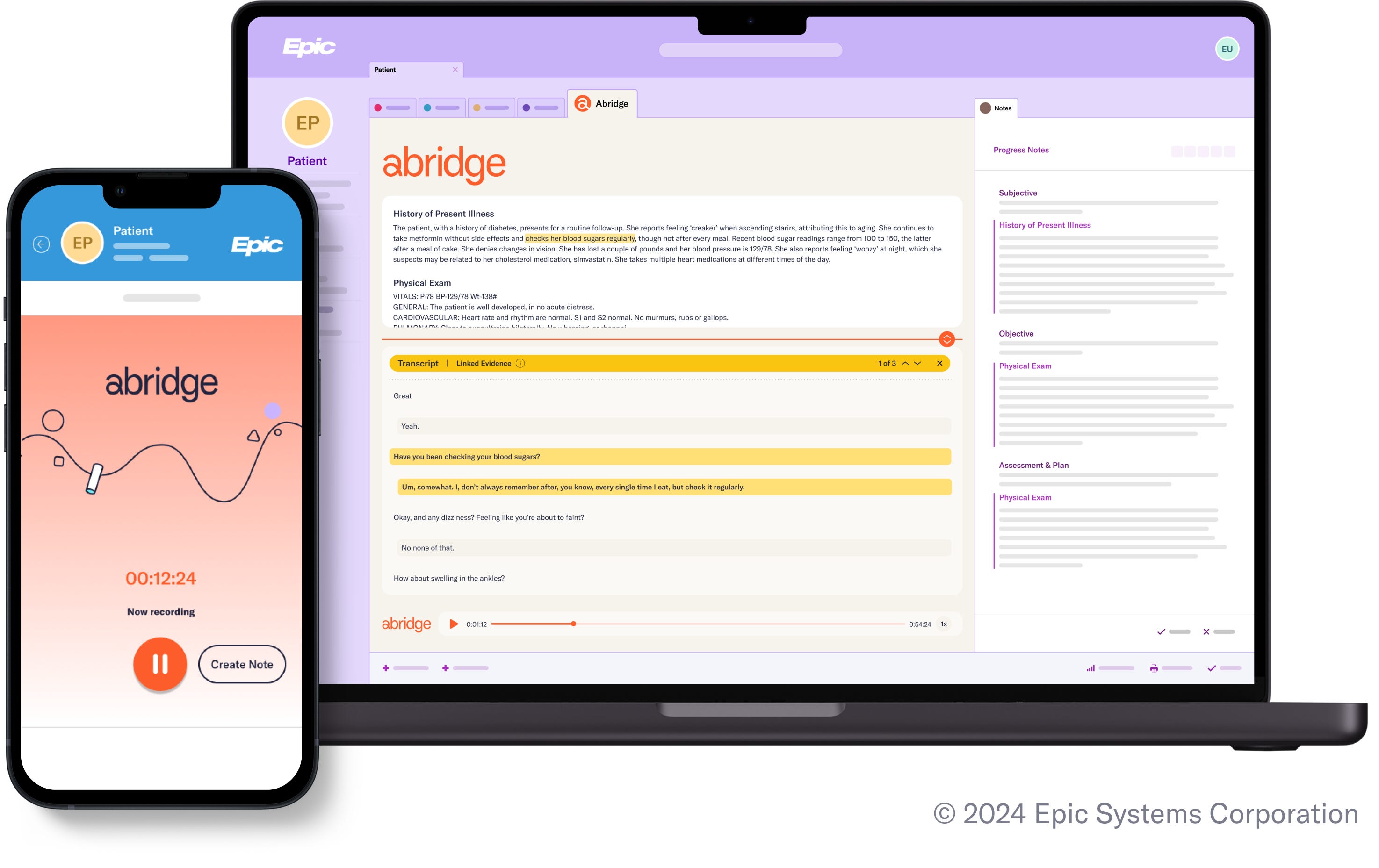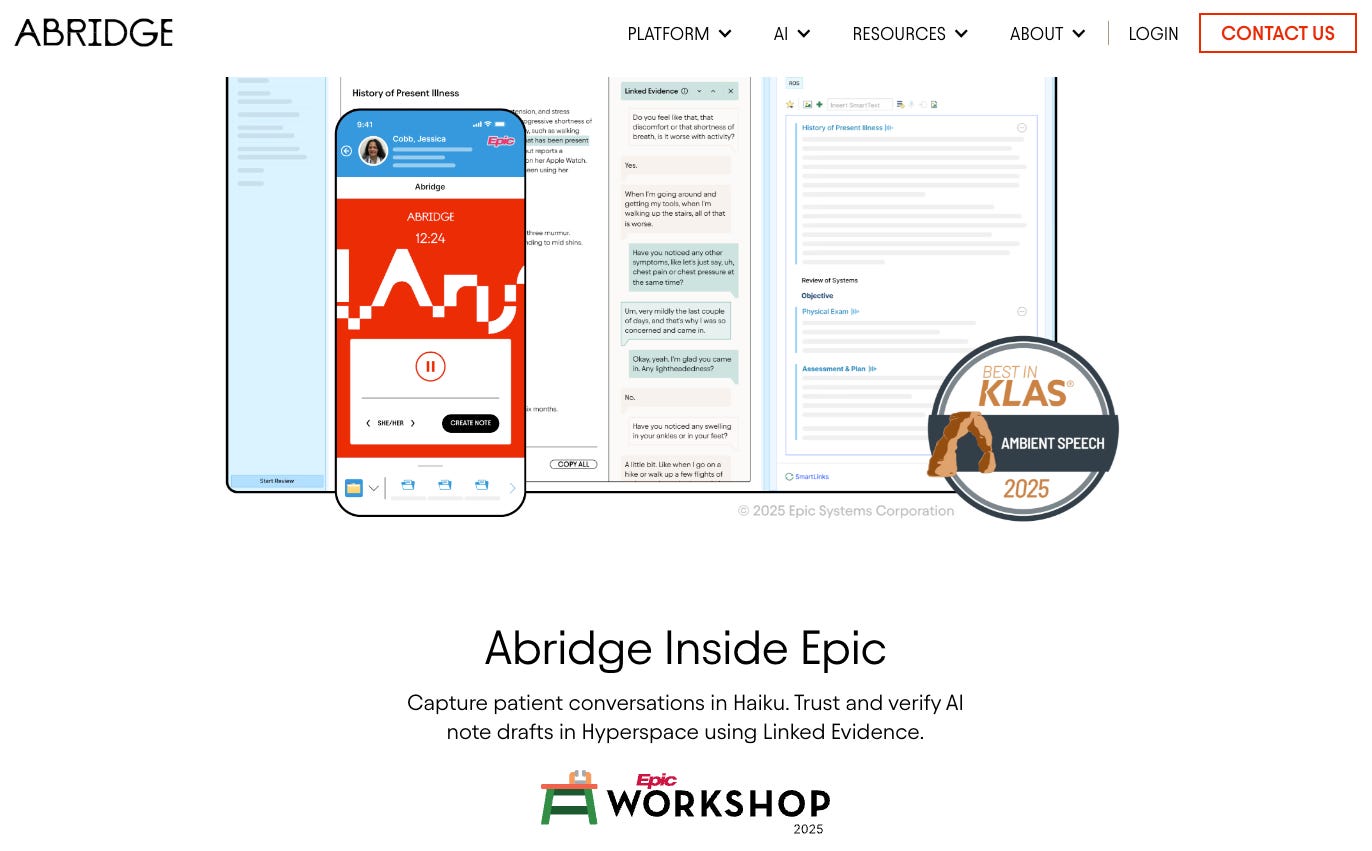
Taylor Hill/Getty Images
- $5.3 billion Abridge became a healthcare AI darling with the help of medical records giant Epic.
- Now, Epic is releasing its own tech to compete with Abridge’s AI scribe.
- Abridge is the latest AI startup under pressure as its incumbent partner becomes its biggest threat.
The hottest AI startup in healthcare is at a crossroads: Medical scribe company Abridge’s closest partner and former shareholder, health records giant Epic Systems, just became its biggest threat.
In August, Epic said it plans to launch its own AI products to assist doctors with administrative tasks. One of those tools will automatically transcribe and summarize patient visits, the booming business behind $5.3 billion Abridge.
Abridge notched a landmark partnership with Epic in 2023. With Epic’s distribution, Abridge became one of the buzziest startups in healthcare, landing top hospital customers and raising hundreds of millions of dollars. The deal also gave Epic a single-digit percentage stake in Abridge, according to five people with knowledge of the deal. Two of those people said Epic sold its shares earlier this year.
Epic’s push into AI highlights a larger tension that’s playing out across tech, mirrored in relationships like Microsoft-OpenAI to Google-Anthropic: In the fast-moving AI race, what happens when dominant incumbents morph from partners and shareholders into competitors?
Abridge ran into a classic startup dilemma, building a business dependent on a giant’s ecosystem that then risks being undercut once the giant rolls out a competing product. It will now have to navigate a minefield as it clings to Epic to maintain key hospital revenue while attempting to cement its fortune beyond the health record company’s reach.
That reach is nothing to sniff at. Epic dominates electronic medical record software, selling its tech to about 42% of US hospitals and bringing in around $5.7 billion in revenue. Its closest health records competitor, Oracle’s Cerner, has about 23% of the market. So Abridge wasn’t surprised by Epic’s AI announcements, its investors told Business Insider — it always seemed inevitable that Epic would want its own slice of the healthcare AI pie.
But those investors said Epic couldn’t have anticipated Abridge would grow as quickly as it did.
The Epic partnership, which made it easier for Epic customers to use Abridge’s tech, was Abridge’s golden ticket. In the two years since that deal, the startup has raised over $700 million from top investors like Andreessen Horowitz and Khosla Ventures, reached a $5.3 billion valuation, and signed over 150 customers, including key Epic buyers like Kaiser Permanente, Mayo Clinic, and Johns Hopkins Medicine.
When adjusted for Abridge’s current $5.3 billion valuation, Epic’s single-digit stake in Abridge would now be worth hundreds of millions of dollars. Epic and Abridge declined to comment on their relationship for this story.

Business Wire/AP
Abridge insiders agreed that the future of that collaboration could get messy with Epic’s AI strategy out in the open. Abridge insisted its software would remain integrated with Epic in a call with hospital customers at the end of August, according to STAT News.
“It’s hard to conclude, are they fighting or are they friends? They’re still talking to each other, but there are a lot of things that make you feel like, wait, what? What’s going on here? It’s a complicated picture,” one Abridge investor told BI.
Abridge faces plenty of venture-backed rivals, too, like Ambience Healthcare, which raised a $243 million Series C round in July. Epic’s plans have flipped that competition on its head.
Epic boasts unparalleled distribution. Like many incumbents, it sometimes lags behind on innovation. Abridge’s investors are hopeful that the startup’s tech has pulled so far ahead that Epic can’t catch up.
“They’ve got work to do. And they’ve probably got the money to go do it, as long as none of their new investors are super pissed off at them,” said Bryan Roberts, a partner at Venrock, which isn’t an investor in Abridge. “But they can’t milk the Epic cow for the next five years. When you have the valuation they’ve commanded recently, that’s what you should expect.”
How Abridge took off
Abridge spun out of a collaboration between the University of Pittsburgh Medical Center, Carnegie Mellon University, and the University of Pittsburgh in 2018, to combat clinician burnout. Two years later, CEO Dr. Shiv Rao launched Abridge’s flagship product to automatically transcribe and summarize doctor-patient conversations, cutting down on the dreaded “pajama time” clinicians spend finishing medical notes after hours.
Abridge also builds its own large language models, which power its suite of software for tasks like medical coding and real-time prior authorizations.
By the time of its watershed deal with Epic, Abridge had raised about $30 million and expanded several hospital pilots into full-blown contracts. The Epic integration proved to be the ultimate springboard. The partnership put Abridge in front of more Epic customers and allowed physicians to use Abridge’s tools inside Epic’s workflows, including its mobile app. Other applications might require doctors to exit their health records software to open a new window or even manually enter data.

Abridge
Abridge also secured venture funding from some of Epic’s customers. Two months after its deal with Epic became public, Abridge announced a fresh funding round that included Kaiser Permanente Ventures, Mayo Clinic, and UCI Health, all Epic customers. By August 2024, Kaiser Permanente had ditched a previous ambient scribing deal with AI startup Nabla and said it would roll out Abridge’s tech across its entire health system, encompassing about 25,000 clinicians across eight states.
Along the way, Abridge’s C-suite has carefully nurtured a rapport with Epic’s AI heads that is, by all accounts, perfectly convivial. The startup has spent countless hours at Epic’s campus in Verona, Wisconsin, codeveloping new features and trading tech tips, according to its investors. At Epic’s annual meeting in August, where Epic announced its coming AI features, Epic executives introduced the Abridge team to potential new customers, one Abridge investor said.
The startup never wanted to compete with Epic.
“I think some startups get up and they’re like, we’re going to be the new EHR. We didn’t have any interest in going down that path,” Abridge CTO Zachary Lipton said in a July podcast interview. “We need to partner really tightly with the other tech providers that constitute the health system’s backbone.”

Justin Sullivan/Getty Images
Epic’s competitive playbook
Epic has a storied history of welcoming new technologies to connect to its software and then, a few years later, moving to compete with them.
In 2020, it dropped its own telehealth feature, powered by Twilio, to compete with companies like Amwell and Teladoc that had integrated their video visit tools with Epic. The previous year, Epic rolled out a built-in messaging feature that overlapped with integrated third-party tools like TigerConnect. Epic hasn’t been afraid to take on bigger fish, either: In 2022, it unveiled a customer-relationship management tool pitched directly against Salesforce’s already-connected health cloud.
With AI, Epic is now running a similar play. A week after announcing its Abridge partnership in 2023, Epic deepened its ties with Microsoft, whose Nuance business has dominated AI transcription in hospitals. Now, Epic is working with Microsoft to build its competing ambient documentation tech, slated for limited release in early 2026.
Epic has been telegraphing its AI ambitions for years, with its investments in machine learning going back to the 2010s. Some of those bets have come with missteps. The company released an algorithm in 2017 to improve sepsis detection in hospitals; four years later, a JAMA Internal Medicine study found that the algorithm missed two-thirds of sepsis cases and frequently issued false alarms.
An Epic spokesperson noted that multiple other studies in the years since have demonstrated positive impacts, including significant sepsis mortality reductions, of Epic’s sepsis model in clinical settings. “We continually improve all of our products and as part of that, we recently released a second version of the sepsis model that works even better,” the spokesperson said.

Taylor Hill/Getty Images
Many of the timelines for Epic’s new AI releases aren’t clear, with various features expected from now until 2027. But even if Epic takes years to release those AI products, startups will likely face fallout from its announcement, said Carl Byers, a partner at F-Prime Capital and former CFO of Epic rival Athenahealth.
“IBM also had a habit of freezing out competitors just by putting out a press release and saying, ‘We’re going to build this feature next year,'” Byers said.
Like IBM, Epic might feel like the safe choice, especially for hospitals that have contracted with Epic for years, if not decades, Byers said. It may also be the cheaper choice for Epic customers if the company chooses to bundle new AI features with existing must-haves.
Byers puts it like this: “No one ever got fired for choosing IBM.”
Abridge’s balancing act
Abridge must now undertake a delicate dance: lock down its existing Epic customers while looking beyond them, pushing deeper into new product areas like revenue cycle management and broadening integrations with rival EHRs such as Oracle’s Cerner, Athenahealth, and Meditech.
Smaller healthcare AI startups that now find themselves in Epic’s shadow could be forced to consolidate, opening opportunities for Abridge to make acquisitions. Rao told Business Insider in August that the startup is considering buys to further accelerate its growth.
Epic, meanwhile, faces newfound antitrust pressures. The company is contending with two lawsuits, from Particle Health and CureIS, which include overlapping claims that Epic attempted to smother competition in the market.
Against that backdrop, Abridge’s investors maintain that the startup has every intention of continuing to work closely with Epic.
“You don’t know how this whole market is going to play out, so why not be a good partner to someone that’s been good to you? Why create an antagonistic relationship where there never was one?” one Abridge investor said. “You’re going to be working together forever anyway, at least in some form.”
Other VCs without financial ties to Abridge aren’t sold on that story.
“I’m sure they’re saying positive things about each other, and they both have good reasons — Abridge because they don’t want to spook their investors and customers, and Epic because they need to be seen as not crowding other companies out,” Roberts said. “But Epic wants every health system that uses Epic to use their AI scribe, not Abridge. That has to be true.”
Read the original article on Business Insider
The post Inside the messy relationship between a medical records giant and healthcare’s hottest AI startup appeared first on Business Insider.




